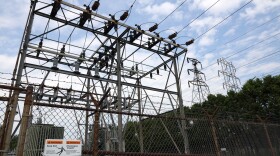With a new federal agency overseeing the sport, horse racing remains under intense scrutiny this summer, even as thousands of fans continue to flock to Saratoga Race Course. On Saturday, racing fans and critics alike witnessed a shocking fatal finish.
In a sport that has seen some of its darkest moments on its highest-profile days, the $500,000 Grade I Test Stakes finish was as grim as it gets.
At the August place to be, football Hall of Famer Bill Parcells was looking on as his filly Maple Leaf Mel was kicking clear, steps from the wire and a perfect 6-for-6 record. Instead, she crumpled, unseating rider Joel Rosario before getting to her feet with a broken leg. She was euthanized moments later before a stunned crowd.
NYRA spokesman Patrick McKenna says it’s a tragic ending for a feel-good horse named for its cancer-surviving trainer.
“That should never be the expectation of a fan who is trying to enjoy an afternoon with their family at Saratoga Race Course or at Belmont Park,” he said. “Yes, injuries do happen just like they happen in every other sport. What we saw on Saturday evening with Maple Leaf Mel was incredibly unusual and tragic. The nature of that accident, the nature of that injury was incredibly unusual.”
Turf writer Natalie Voss is editor-in-chief of the Paulick Report and was in the press box for the Test.
“I’ve never heard so many people go from cheering to just complete, stunned silence so quickly,” she said. “It was a really odd and unsettling and terrible experience to feel the crowd reaction as well as having your own personal reaction to what was going on.”
In recent years, racing has been temporarily called off at iconic venues like Churchill Downs in Kentucky and Santa Anita in California after dozens of horse deaths made national headlines.
There have been nine deaths at Saratoga since April, according to data tracked by the New York State Gaming Commission.
McKenna says the situation is different on the New York circuit.
“They have seemed to come to the conclusion that it was an issue with the main track surface itself, which is very different than the circumstances around what we're looking at in Saratoga,” he said. “You know, the main track is as consistent and responds to weather as well as any surface in the country, if not the world. It was completely renovated in 2019, just like the Oklahoma Training Track was completely renovated in 2019. Each of these incidents that we're discussing are substantially different from one another.”
Patrick Battuello, founder of non-profit watchdog Horseracing Wrongs, contends animal cruelty and deaths are baked into racing — and most incidents aren’t carried on national TV like the Test Stakes was.
“Knowing going in that horses will die, absolutely guaranteed, are you comfortable with that? And it doesn't really matter how many. Those are 15 beautiful, intelligent, sentient lives that are lost each summer for $2 bets and for frivolous entertainment,” he said. “And if you're comfortable with that, then so be it. But if you're not, there is no other choice here.”
McKenna disputes that characterization.
“We don't believe so,” he said. “We aspire to get that number to zero.”
NYRA says it is cooperating with an investigation into the incident by the state gaming commission and the new Federal Horseracing Integrity and Safety Authority, which is in place during a Saratoga meet for the first time after implementing a universal anti-doping program for the sport. HISA did not respond to a request for comment from WAMC.
Voss says the death of Maple Leaf Mel raises more questions than answers.
“I stay in this business because I think there is a way to race horses that is ethical and welfare oriented and has the minimum amount of fatal injuries,” Voss said. “Trouble is, none of us knows what minimum amount is going to equal.”
Copyright 2023 WAMC Northeast Public Radio. To see more, visit WAMC Northeast Public Radio. 9(MDA3OTAzNzgzMDEzMTIyMTYyODIxZDdjYg004))







